#mistakes he clearly doesn't REALLY believe it. he clearly thinks he is ultimately in the right. at most he admits his method was flawed
Explore tagged Tumblr posts
Text



Rook: [Solas] sees a problem, and he thinks of a solution that has huge, horrible knock-on effects. And then he does it anyway, because there's no way anyone else could come up with something better! And it's okay that he did incalculable damage to the world, because he's really sad, you see?
I love it when Rook calls Solas out on his shit. Even when he's not actually there. This is what I've been saying! What a lot of people have been saying in fact!
And I think this dialogue really encapsulates the main difference between Rook and Solas that allows Rook to accept their failures and move on where Solas can't, because... yeah, Solas is really sad about all the damage he's done! But that's all he is, and being sad about hurting people doesn't mean anything if you don't strive to do better. When Rook gets people killed they stop, they grieve, they wish things had ended differently, but then they accept that it's done and resolve to do better in the future. They learn from their mistakes, because doing good is more important to them than being the best. Solas, meanwhile, insists that his plans are the best and never considers the consequences in the future (or the immediate consequences for people who aren't him), and then when those plans inevitably go horrifically wrong for everyone because he just goes with whatever sounds like a good idea to him at the moment he doesn't think about why that happened. He just sits and wallows in how bad he feels and finds ways to blame those idiots who refused to just do what he said because he said so and never for a moment considers that maybe there was another way because obviously his plan was the best plan because he's just so goddamn smart and poor him, if only those stupid mortals could see that he was better than them everything would be fine. He can talk a good game about how he's just a man and he makes mistakes if you give him the opportunity to show off how humble he is, but he never actually internalises that maybe his plans were deeply flawed from the start and trying to do the same thing but from a slightly different angle is doomed to failure (seriously, if you call him on his shit instead of giving him opportunities to play the humble hero he makes it so obvious that he thinks he's better than everyone. It's actually kind of funny given how consistently he fucks up every plan). And so when the next big, awful decision comes around Rook considers what happened before and relies on the expertise of the people around them to avoid the mistakes they made in the past while Solas does the same shit all over again because he's convinced no one could ever do better than him. Accepting your regrets isn't just about feeling bad, which is the mistake I think a lot of people make when it comes to Solas. It's about doing better, which Rook makes a real effort to do and Solas actively avoids because it would mean admitting not only that he failed but that his plans sucked—and frequently were morally bankrupt—to begin with. It's much easier to sit there and wallow than it is to try to be better than you were; Rook recognises that the effort is worth it, and Solas doesn't.
#dragon age veilguard#i've seen people complaining about him calling himself a god in the fake dagger ending#but that's not actually a new belief of his. he clearly thinks he's something Above the mere mortals of modern thedas#he may not usually call himself a god and he may claim he doesn't think he's one but he very obviously does think he's a god#at least in comparison to mortals#him (nearly) screaming 'I AM A GOD' when you beat him is his mask-off villainous breakdown moment#he's so convinced he's a form of life that's Better than modern thedosians that he can't handle the realization that he's not#and that's why he can never move past his regrets where rook can! because no matter how many times he insists he's just a man who's made#mistakes he clearly doesn't REALLY believe it. he clearly thinks he is ultimately in the right. at most he admits his method was flawed#the fake dagger ending is about showing him once and for all that he is NOT better than mortals. that's what makes it so satisfying
7 notes
·
View notes
Note
Wall of the faithless isn't canon in bg3. They changed alot of things actually. So no Gale isn't "scared" he's just an obsessed asshole who doesn't learn from his mistakes.
Oof...

There's really nothing I can say except: you're wrong. The City of Judgement and the Wall of the Faithless are canon to BG3. If you don't like Gale, that's fine, but you don't have to make things up or completely disregard the lore to do it. Larian Studios literally hired people from Wizards of the Coast—the company responsible for all the canon lore, characters, and campaigns in D&D—to help them with the story. It took them five years, I believe, to fully study and understand the lore. They constantly conferred with the team to double, triple, and quadruple check every slice of content they added to the game, and parts of the game are now considered canon to D&D 5E.
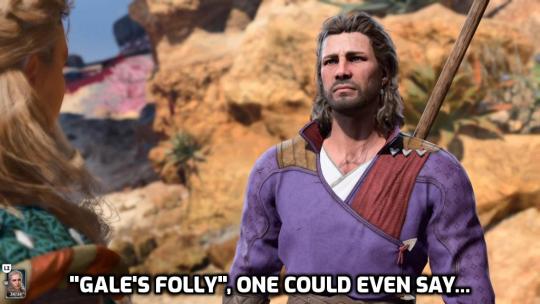
As for Gale "not learning" from his mistakes ... when you first meet him, he literally admits he made a mistake with Mystra. Though personally I don't see it as the "power-hungry" move people seem to think it is. Gale simply wanted to be considered an equal to his partner (really his groomer), which is a perfectly healthy and normal desire for anyone in a relationship. Your partner should treat you like an equal, but Mystra very clearly saw Gale as a pet. A trophy. A worshipper. Subservient. Beneath her. A silly mortal with delusions of grandeur (which she cultivated), which is really rich when you learn she was once mortal herself. Mystra is a hypocrite.
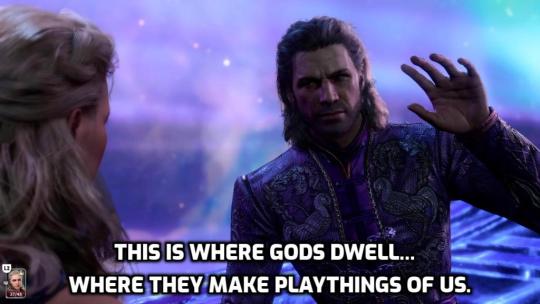
Gale tried to prove himself worthy of equality by trying to bring Mystra what he thought was a piece of her missing Weave. For anyone who doesn't know, the current Mystra was torn to pieces by Cyric and Shar, then put back together by her Chosen. Though back to full power by the events of BG3, she's still technically missing pieces of herself, and Gale mistook the Karsite Weave for one of those pieces. Instead of simply telling Gale it was corrupted Weave, she let him go on believing it was hers. Personally I think that's because she was tired of him (maybe he got too old for her 😒) and was hoping he would do something that, in her mind, would justify abandoning him—but I admit that's full conjecture on my part. What is true is that she knew the orb wasn't hers, but for some reason she let Gale think it was. Even after she abandoned him and left him to die, she never told him. Not until she realised she could use him.
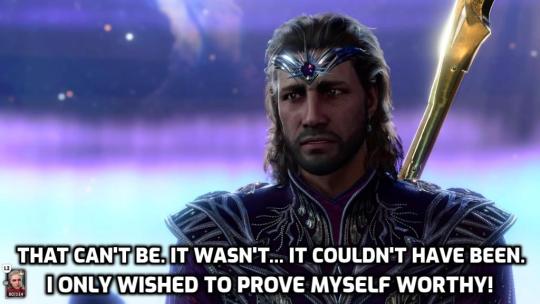
In Act 3, while the argument can certainty be made that he's thirsty for power, Gale ultimately becomes fed up with the gods because, as he knows better than anyone, they treat people like commodities. While I have no intention of ever ascending him myself, it looks like he actually makes good on his word. He doesn't threaten or toy with his followers, he inspires people to walk their own path, he only asks for prayers as payment (as without some form of devotion, gods in D&D cease to be), and if you romance him ... he ascends you into godhood as his equal. Mystra could have done this for him, she just didn't want to. And if you don't want him to ascend, it's genuinely so easy. I don't understand what people are complaining about. It takes one conversation with zero checks to convince him to completely abandon his ambitions. One. If he was truly "power hungry", it wouldn't be that easy.
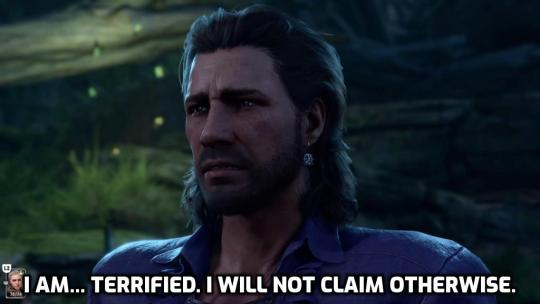
Again, I would argue that Gale's true goal isn't really power, it's freedom, and divinity gives him that freedom. He has many conversations where he makes it clear he doesn't want to live under the gods' thumbs anymore; which, in a world like Faerûn, is extremely understandable. As I said in my Wall of the Faithless post, he's scared. Eternal torment for a simple mistake, one of which could've been avoided if Mystra told him the truth or treated him like an equal? When your partner is a goddess, how can you not feel inadequate? And if you convince him to give up the crown, he's perfectly content with Mystra's forgiveness. Even in the Early Access, that's all he really wanted.
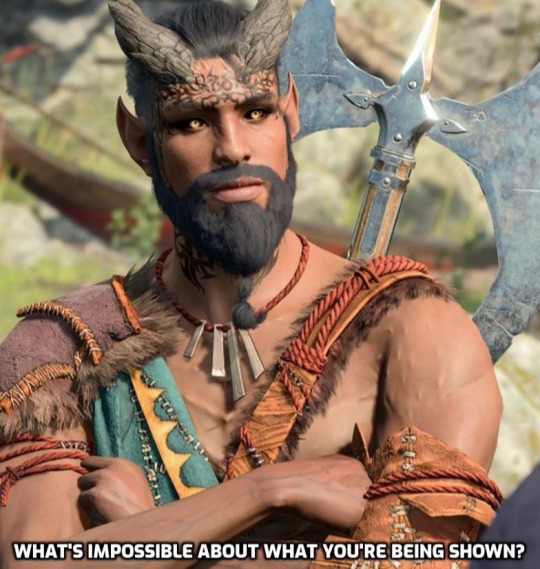
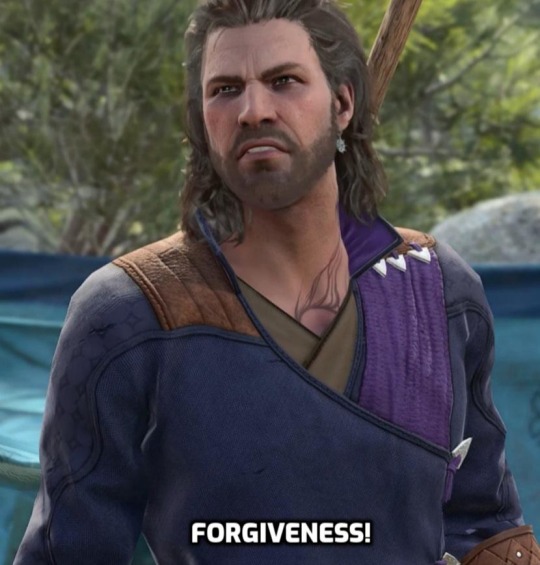
Gale's far from perfect. He's arrogant and overconfident and insecure and he can be prone to emotional outbursts (most of which he apologises for, however), but he's nowhere near the heartless, power-hungry monster the haters seem to think he is. He is, in fact, one of the most compassionate companions in the entire camp, to the point that he accepts everyone, including Minthara. He votes for Astarion to stay when you find out he's a vampire. He gets mad at you if you surrender him to the Gur. He's one of the only companions who will openly marry/stay with you if you become a mindflayer. He's willing to sacrifice himself to save the world, and willing to damn himself to be with you. He loves every act of kindness, while hating every act of cruelty. I understand that the bugs from launch ruined a lot of people's perception of him ... and unfortunately some of those glitches are still present even now, but he is a good man.
#bg3#baldur's gate 3#gale of waterdeep#gale dekarios#karlach#karlach cliffgate#wall of the faithless#city of Judgement#wizards of the coast#dnd#d&d#dungeons and dragons#astarion#minthara
2K notes
·
View notes
Text
Okay bear with me folks, I have some ~thoughts~ about the Vanessa/Wade relationship (or frankly lack thereof) in Deadpool & Wolverine. I should start by saying that I am analyzing this with the (likely erroneous) assumption that everything on screen is 100% intentional and mindfully written to deepen the characters and inform their arcs. For the record, I don't necessarily believe that's true - there is certainly room for mistakes, lazy writing, confusing plot elements, or in this case, sidelining a potentially strong and important character for nebulous reasons (I'm guessing scheduling conflicts + run time concerns + actor's strike complications but idk for sure). (Also thanks to @gossippool and @kendyroy for encouraging me to post my thoughts instead of just rambling in the tags in the first place, y'all are the realest)
Long rambly post below the cut fyi
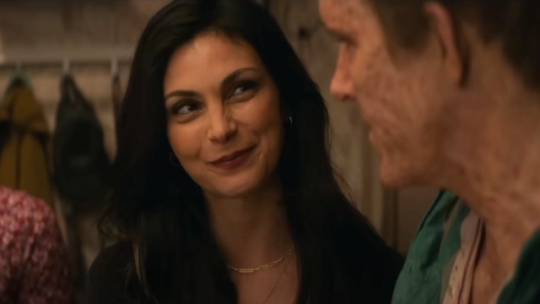
Now, granted, it has been a while since I watched the original Deadpool so I am not as well-versed in their early relationship as I am in the handful of scenes Morena Baccarin has in dp3, but I do think it is pretty canon that Wade generally struggles to express his deeper worries and feelings (without filtering it heavily through crude humor, sex, and pop culture references of course), especially after the events of dp1 and the physical and mental damage he sustains, and Vanessa is frankly no exception despite how much he cares for her. The entire first movie hinges on the fact that he doesn't really believe she could love him in his post-Francis mangled state, which is pretty contrived imo given that the film has established already how bonded they are, and she doesn't strike me as being written to be so shallow as to reject him based on a physical deformity. I mean iirc she wanted to stick around through chemo despite him being literally riddled with inoperable cancer, so she clearly is in it for the long haul (at least in dp1), messiness and all.
Now, in dp2, obviously she is shot and killed early in the film, and Wade spends much of the rest of the film wallowing in his very profound grief, trauma, and guilt over losing her due directly to his violent lifestyle. He goes to prison, he basically gives up on life and seems very resigned to dying once he has the power suppressant collar on, even excited to do so so he can be reunited with her. She is mostly sidelined as a Fuzzy Dead Wife trope basically, but the important thing here is that he spends weeks if not months in the throes of despair over losing the love of his life just as they were trying to start a family, and trying to reach across the boundaries of death to be with her.
Now, my first couple times watching dp3 I was frustrated by the trite narrative presented in the interview scene towards the beginning - specifically Wade's whole "my girl is getting tired of my shtick and I need to show her I matter". It felt contrived and disingenuous, and I just brushed it off as iffy writing, a means to an end, but the more I reflect upon it the more I think it is based in an emotional reality that is just handled with a very light touch by the film in favor of fanservice and Poolverine content (NOT that I'm complaining in the slightest - I think this movie is a masterpiece in many ways, albeit a flawed one but that's beside the point here), which for the record I am not against because I think it lends it an air of realism. This is Wade's story after all, Vanessa is a part of it but it is ultimately about him and his journey.
Basically, I think the combination of what happened to him in dp1 (the brain damage, the trauma, the awareness of the fourth wall, etc) followed by the events of dp2 (Vanessa's death, his grief and the associated guilt and trauma of being the direct cause of her death) led to an unbridgeable emotional gap between the two of them that ultimately leads to their breakup.
It's important to note that I don't think Vanessa has any recollection of her own death, given that Wade goes back and saves her before she can take the bullet, and so of course she can never fully fathom what Wade went through grieving her and their life together and their potential family, for however long he spent between her death and bringing her back with Cable's device. She can try (and she clearly does in the one scene I'll talk about next) but I fear she accepts, maybe even in that scene, that she can never succeed. He is beyond her reach by this point, and vice versa, his experiences having fundamentally changed him.
The one scene we really see from their relationship between dp2 and dp3 is the one where Cassandra mind-gropes Wade in the Void and we see Vanessa struggling to reach Wade across this aforementioned gap - she wants him to open up, she wants him to share what he's going through, she wants him to be the person she initially fell in love with (not even selfishly - to her nothing has changed really, because to her no time has passed). But not only does he not understand what she's really asking for but he responds in such a way that makes me think he has unprocessed issues that are only tangentially related to what she's saying - ie the stuff about mattering, about asking her if she even wants to be with him, etc. And he's not the Wade Wilson she met back in dp1 anymore. He watched her die and grieved her and brought her back, believing it would make everything go back to normal and they could resume their life together as if nothing had changed, but he has been fundamentally changed in a way that she can't grasp, even if he WAS good at externally processing his trauma openly without the artifice of wry jokes. She didn't "come back wrong" - instead, she came back exactly the same as before, but HE'S different now. Not wrong, per se. But changed.
It's an interesting scene because it's obviously a memory, and a crucial one at that, but you can see how Wade is misunderstanding what she's saying, viewing it through the prism of his own lack of self-worth and his own hopelessness - he takes away that she thinks he doesn't matter (even though like he says she didn't actually say that, but I don't think Cassandra invented that wholecloth - I think she pulled it out of his psyche because that's what he believes deep down, hence why his fixation on mattering even though she never said those words exactly), he takes away that she doesn't want to be with him, that she thinks he's nothing. Which would be frustrating as an audience member to witness as a pretty simple misunderstanding which could potentially be solved with one conversation, but it feels believable to me that these two people who have shared a great love would be fundamentally separated by unimaginable, cosmic trauma, and the on conversation they would need to have to rectify the misunderstanding is one that is impossible for Wade to verbalize and equally impossible for Vanessa to conceive of. It was one thing when they had shared trauma like violence and SA in dp1, but what Wade has gone through in dp1 and dp2, humor aside, is unfathomably traumatic, brain-breakingly so even, and that's not even factoring in the possible mental illnesses he now struggles with (I've seen folks suggest schizophrenia, DID, depression, etc. but I won't get into armchair diagnosing a fictional character here - suffice it to say he is canonically unwell as a result of what has happened to him, and yes it manifests as quirky fourth wall breaks and cheeky one-liners, but within the universe of the movies he is undeniably profoundly mentally ill, and that includes this humorous alter ego he created to cope with his trauma).
I think off-screen Vanessa probably really tried to reach him, maybe for years (the six year gap implies to me that they didn't break up immediately, that they tried for a while to stay together), trying to get her Wade back, but that Wade is gone. He struggled to express that to her until eventually he started to feel rejected because he couldn't express his trauma or how much he has changed, because even he can't fully conceive of the gulf that has formed between them. The truth is, he WANTS to be that Wade again, for her and for himself, but that Wade died when she died. Or maybe he had already started dying when Francis got a hold of him in dp1.
Anyway, all this is to say, I think Morena Baccarin WAS criminally underutilized in dp2 and dp3, but I think there is a strong argument to be made for the believability of their breakup regardless. I think even relationships built on enormous love can crumble due to trauma, and what Wade suffers over these movies is mind-bogglingly enormous trauma. It's especially heartbreaking that he blames himself for their relationship ending, talks like she just got tired of him, thought he didn't matter, whatever. But it is a credit to him that he never seems to feel anger towards her about it. He doesn't seem to feel entitled to her, though he longs for her and what they had and what she represented (hope, love, a future, a family), but ultimately she becomes more of a symbol of what he lost when he gained his powers, because let's be super fr right now - even if they had succeeded in having a baby, not only would they have lived in fear of her or the kid getting killed, but ultimately Wade would likely outlive both of them even if they managed to die natural deaths. The moment he gained his powers he was already destined to lose her, which is heartbreaking because she was the only reason he opted for the treatment in the first place - so he could stay with her.
I think a big part of Deadpool & Wolverine is watching Wade continue to process his own motivations (vis-a-vis Vanessa but also his other friends) and how he does eventually let go of the idea of "mattering" in favor of just saving the people he cares about (*cough* and being saved right back *cough* by Wolvie, as the final line and shot implies). And in the process he finds someone new who cares about him, who thinks he matters, who tries to sacrifice himself for him and his friends after mere days of knowing him, who comes home with him at the end of the story, who breaks his own centuries-old patterns, who has also experienced unimaginable grief and trauma, who has struggled with wanting to die and being unable to, who not only matches his crazy but matches his FREAK and also not only won't die on him but CAN'T die on him - and more importantly cannot be randomly killed by a stray bullet.
Idk if any of this makes much sense but I do think if you read between the lines and consider the potency of trauma and grief, guilt and emotional damage at play here, Vanessa and Wade's off-screen breakup is actually pretty realistic, and really heart-breaking to boot.
You can tell she still cares about him in so many ways - she shows up for his birthday party, she shows up to his welcome home party at the end, she finds excuses for physical contact multiple times, her eyes get soft when she looks at him, but there is a distance there that Morena Baccarin does an incredible job of portraying. She cares about him deeply, she has mourned the loss of their potential life together, she has let him go and accepted that the Wade she fell in love with is gone, but she wants him in her life even though she's moving on because she realizes he's gone somewhere she can't follow (literally and figuratively). And she wants him to be happy which is why I fully believe she would immediately clock the Poolverine of it all and not-so-subtly encourage them to make it official.
Anyway. Poolverine forever. Nothing against Vanessa at all - I think she delivers a nuanced and beautiful performance, I think their relationship is sweet and heart-wrenching in large part due to her acting chops, especially given how little she is given to work with - but I think their relationship was sadly doomed from almost the very start, because Wade becomes this traumatized superhuman and Vanessa would always be at risk in his orbit, but also would always on the outside of his multiverse superhero experiences. I think it's weirdly beautiful, even if I am filling in a lot of gaps and giving the writers maybe undue credit.
Anyway... thoughts? Please DM me or write in the tags, I am feral about this movie and just want to talk about it with anyone haha. If you have further insight into these characters too I'd love to hear it - I am by no means an expert in these movies or characters!
#wade wilson#deadpool & wolverine#deadpool and wolverine#poolverine#deadclaws#wolverine#deadpool#deadpool 3#deadpool x wolverine#vanessa x wade#rambly meta thoughts#anyway thanks for reading if you made it through#I def didnt edit this much just sorta wrote it out#I have more to say but it will have to wait I think#deadpool meta#vanessa meta
431 notes
·
View notes
Text
"Qui-Gon just abandons Obi-Wan in favor of Anakin, what an awful person!"
Yes, how dare Qui-Gon look at the situation at hand and decide that the 25 year old apprentice who regularly is allowed to handle a lot of responsibility on his own anyway needs him less than the 9 year old untrained child who is only even HERE because Qui-Gon told him he could have a future here. How dare Qui-Gon prioritize the child who can't really go back and doesn't have another familiar face to go to if the Jedi don't take him in. What a terrible awful person he is for making that decision to put Anakin first when he feels backed into this particular corner.
Obviously some of his choice is related to his belief in Anakin being a child of prophecy, sure, and I do think that the Council is completely RIGHT for saying Anakin isn't really made for this life and that he'd probably be happier elsewhere, but I also think people put a lot of extra emphasis on Obi-Wan's feelings in this scene as if he's some little waif who can't survive without Qui-Gon rather than the perfectly capable 25 year old adult that he actually is. As much as this decision surprises and upsets Obi-Wan a little, Obi-Wan would be FINE on his own, whereas Anakin might struggle more if he doesn't have Qui-Gon's support.
There is NO WAY that Qui-Gon isn't taking that into consideration. He knows this decision is going to upset Obi-Wan, he clearly does because he HESITATES before he decides to make that proclamation, but he HAS to prioritize Anakin in the moment and trust that Obi-Wan will understand and be okay. And you know what? He's RIGHT. Obi-Wan DOES ultimately understand where Qui-Gon was coming from and why he did what he did, which is why he apologizes to Qui-Gon later.
Qui-Gon's not a monster who doesn't give a shit about Obi-Wan's feelings, he doesn't drop Obi-Wan without considering what Obi-Wan will feel about it in the moment, he isn't doing this out of a desire for glory or fame that Obi-Wan can't provide. He's putting FAITH in the training he's given Obi-Wan, he's trusting that he's done his job and that Obi-Wan will be able to manage on his own from here. This is actually the exact thing Obi-Wan has to learn how to do in his relationship with Anakin in the next film! He has to let go of his worry that Anakin isn't ready, that Anakin won't be able to manage on his own, and allow Anakin the freedom to make his own mistakes.
Qui-Gon is having to do this in a less than ideal way, for sure, but that isn't because he doesn't CARE about Obi-Wan or because he cares for Anakin more. It's a last resort option, the lesser of two evils. He believes that Anakin needs to be trained, that it's the will of the Force, and since the Council won't accept Anakin on his own merit, Qui-Gon now has to make a choice, and he makes the one that seems like it will ultimately cause the least amount of pain to everybody involved in the long run.
#star wars#qui-gon jinn#obi-wan kenobi#istg i am so tired of obi-wan being woobified so that qui-gon can be villainized
79 notes
·
View notes
Text
i think it's so interesting how different book!yassen and tv!yassen are.
first off how book!yassen sent alex to scorpia, it was a mistake because he wasn't thinking clearly. tv!yassen did it on purpose (to the best of my knowledge).
book!yassen did not want alex to kill. he tells him this twice, “killing is for grown ups.” and asking alex if he can really pull the trigger and shoot him, when alex breaks into the boat during eagle strike. going into great detail to dissuade alex from doing it, and all of me believes not just because yassen didn't want to die in this moment. this makes sense for book!yassen because he himself didn't want to kill. so he's trying to save alex from his own fate.
tv!show yassen doesn't seem to have any issues with killing. he doesn't particularly enjoy it, but it's his job and he does what he has to do so he can survive. so he's okay with encouraging alex to do it. by telling him he should view the people he's assigned to assassinate as nothing more than targets. tricking him into helping assassinate max. encouraging him to let go of his emotions. he wants alex to join him by his side.
ultimately while their methods are different, their end goals are the same. they both want to protect alex. book!yassen thinks he can achieve this by pushing alex away, and tv!show yassen thinks he can achieve this by pulling alex in closer. and both work because they're so compelling.
#i didn't phrase this very sensibly but i hope the point comes across!!!#they both love alex very much and don't want to see him die#also worth noting. i can't see tv!show yassen putting alex in a bullfighting ring. for really any reason#alex rider#yassen gregorovich#alex rider tv#alex rider books#there was another thing i wanted to mention but its completely gone from my mind. if i remember maybe ill add it in a reblog.#they're the same character but they're different. i love them both dearly they mean a lot to me.
208 notes
·
View notes
Text
Why Not Making Byler Canon Would be a Massive Mistake...
Okay, so clearly the Byler brainrot has been getting to me. But this post will be about how Byler would fundamentally improve Mike (and Will's) characters, and making them canon would be an insanely easy way for the Duffer brothers to prove their masters in story crafting and writing.
Unlike a lot of people on this sub, I'm not one to believe Mike was secretly in love with Will the whole time and was using El as his beard to conceal being gay. I think there's enough evidence to prove that he was in love with El, probably for all/most of S3. I'm also not one to just ship two guys because I'm a "teen girl who likes f*tishizing MLM" like a lot of (honestly mainly misogynistic) believe.
I ship them for one simply reason: Mike, especially, becomes an infinitely more interesting, complex, and likeable character by doing so. I loved S1 and S2 Mike, and was so deeply invested in his character, his eventual reunion with Eleven, and his friendship with Will when I was younger.
And I never understood what happened to Mike between S2 and S3. Being a good friend was his defining trait of S1/2, so what happened that made him such a selfish and self-absorbed character? It never made any sense to me, and I just chalked it up to him being a cringy preteen.
But no one else has trouble maintaining a relationship and their own sense of identity/selfhood, even the other preteens on the show. Hell, El's whole arc is about moving away from this sense of dependence on others for her identity.
Now I don't think he was secretly in love with Will the whole time; there's just not enough evidence to say that he wasn't in love with El (atp) and I do think his feelings were genuine. What there is evidence for is that he fused his identity/self with being El's boyfriend, to the detriment of his friends, his girlfriend, and ultimately himself. He could think of nothing and no one outside of El, which is age appropriate but also deeply unhealthy.
There's also evidence to suggest that he feels playing with his friends and otherwise indulging in hobbies/anything outside of his girlfriend is a "kid" thing based on his fight with Will. In fact, he intentionally distances himself from Will, which to me indicates that he viewed Will as "childish" and too far from heternormative boyhood to fully indulge in a friendship with.
At the end of S3, we see the infamous awkward make-out session that was one of the first indications that Byler could be real to me. Because it just didn't make sense to me; I get struggling to say I love you, especially for an adolescent boy (even if they really mean it), but after El affirms her feelings shouldn't he look happy? Instead, he's just confused.
In S4, I believe that this is when Mike really begins to fall for Will (without even knowing it). He's so obviously jealous over who the painting is for, which just doesn't have a heterosexual explanation; he's paying close attention to Will when he should notice his girlfriend's struggling; he, for some reason, is still having issues with saying I love you even though there's been no explanation for why he can't; all he does is fight with El and seems more "in love" with (the idea of) her when she's absent.
I think what's happening here is he's realizing that everything he wants in his relationship with El, he gets from Will. Self-assurance: emotional intimacy: mutual understanding: and especially a need for him that validates his protective instincts. And I don't think he's even conscious of it, but he just can't hide it from his face (or his actions) at all.
I've been on the fence about canon-Byler because of David Harbour's comment about Mileven being firmly at the forefront of S5 and that moment in S4 at the pizza parlour where Mike almost confesses to loving El, which seemed incredibly sincere. And ultimately, I still don't know if they have any chance in S5.
But what I do know is that Mike and Will complement each other the most out of anyone in the show. They can complete one another, recontextualize all of Mike's incongruous behavior, and illustrate that the Duffer brothers are thinking about their story beyond basic (and outdated) tropes about teenage boyhood and douchey male behavior that emerges post-puberty.
So even if Byler never becomes canon, I will maintain that they would be one of the best things to happen to Stranger Things. I'd be content with another love interest being introduced for Will, but I honestly don't think anyone else could do this much for the writing and story as making Byler canon (at least not in a single season). Only time will tell.
#byler#will byers#mike wheeler#stranger things#st5#byler analysis#byler endgame#byler is canon#byler s5#byler nation
57 notes
·
View notes
Text
The Great Wave - Chapter 12 Review
‼️SPOILERS FOR THE CHAPTER‼️
Oh my god Grougalorasalar was just spitting facts in this entire chapter....
Daddy's right, yugo's fucked.
Sorry people I actually do agree with most of what Grougalorasalar said. That is, most. Not entirely. And I'll explain that later on.
Besides Grougalorasalar's facts, let me just say that I really loved how this chapter really showed us some deaths that occurred during the war since season 4 never showed these before.
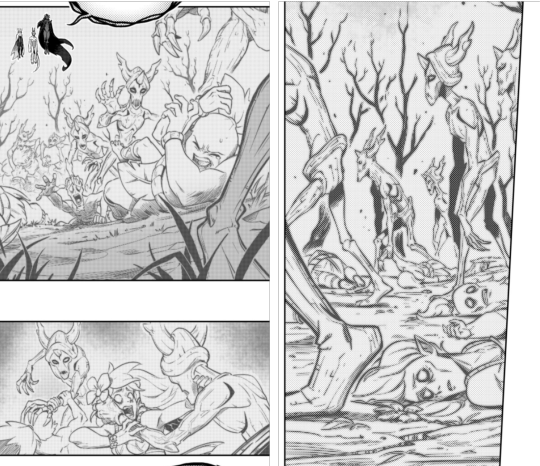
(Like what happened to the bodies after the war? Did they get buried or got disintegrated??)
Not only does this show that there were more casualties than expected when the war was happening, but it's also telling us that there will be more chapters depicting death and loss Iike these with no visual restraints.
Now back to Grougalorasalar.
This fine ass man dude listed so many things that the eliatropes have done whether those actions were intentional or not.
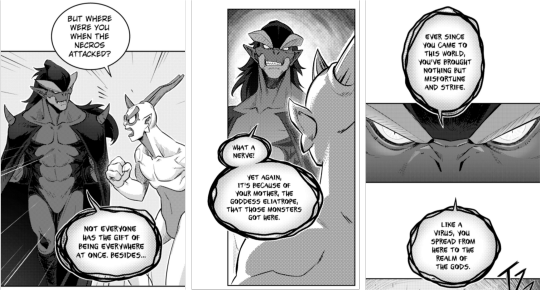
Like how he listed the Eliacube, Nox, Qilby, Ogrest, Oropo, and the Eliasphere...
Oh! Speaking of Qilby, what he said about him may be a foreshadowing.
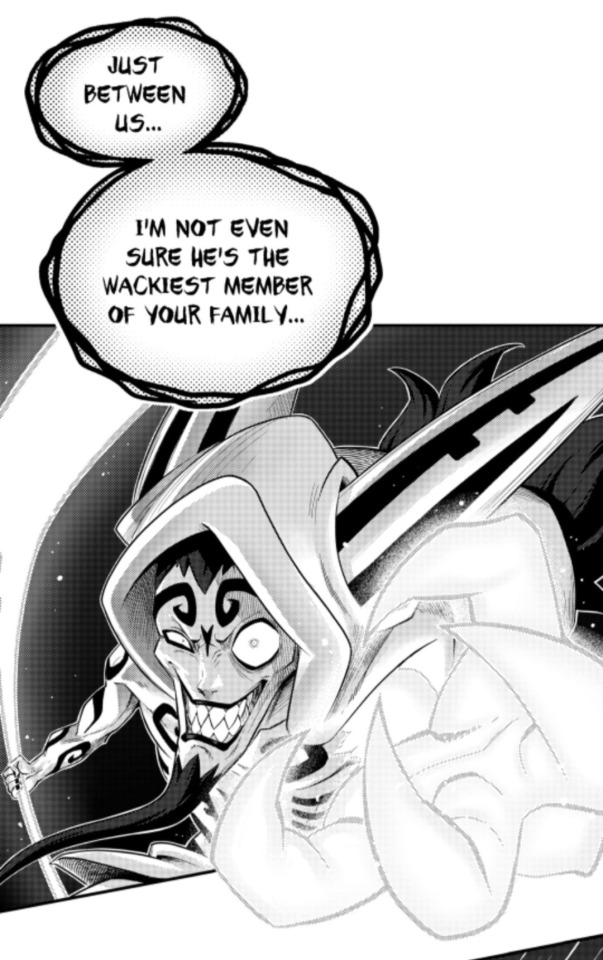
"I'm not even sure he's the wackiest member of your family..."
Doesn't that sound like a major foreshadowing about how Yugo will end up being far worse than Qilby?? 😭😭😭
Like come on, we got that wave coming up soon so Yugo might as well end up copying big brother right? 💀💀
But anyway, during Grougalorasalar's explanation, he actually clears out one problem that people have been trying to figure out:
How could he say all these things while knowing he had assisted Ogrest with the other primordial dragons?
Well we finally know the reason why now.
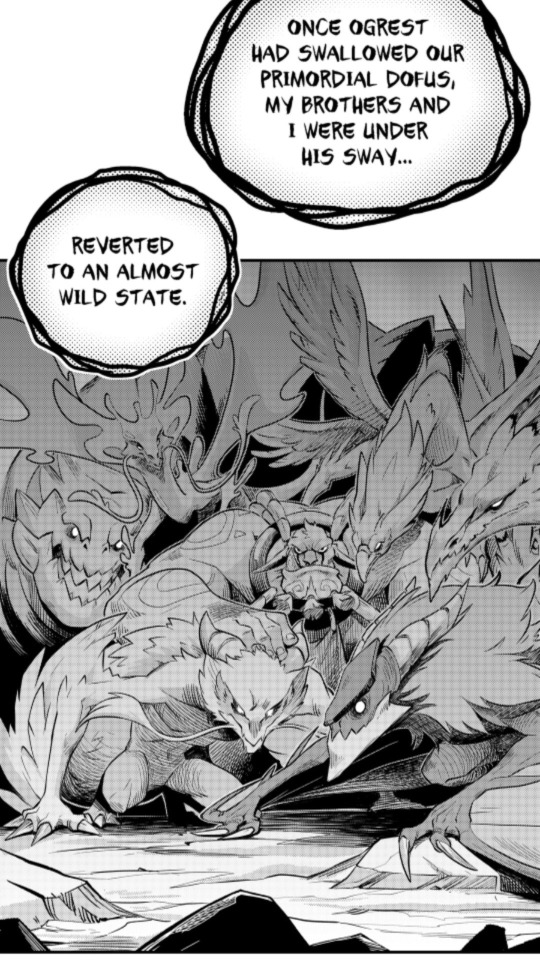
It surprisingly makes a lot of sense if we think about it.
Ogrest possessed all the primordial Dofus at that time, so it wouldn’t be surprising that he could control six dragons. Their behavior during the ovas, while they were fighting Dally and Yugo, seemed almost primal, despite the fact that we knew they could talk. They surrounded Ogrest as if he was their master, and their eyes were completely devoid of any emotion.
It makes so much more sense now because back when the great wave's first volume dropped, people kept wondering why Grougalorasalar had the nerve to speak to Yugo like that in his dream when he had clearly played a role in one of his mistakes.
And it also made sense why Aguabrial had been acting feral towards Dally and Yugo, especially since he had previously interacted with them in the manga that occurs between season 2 and the OVAs.
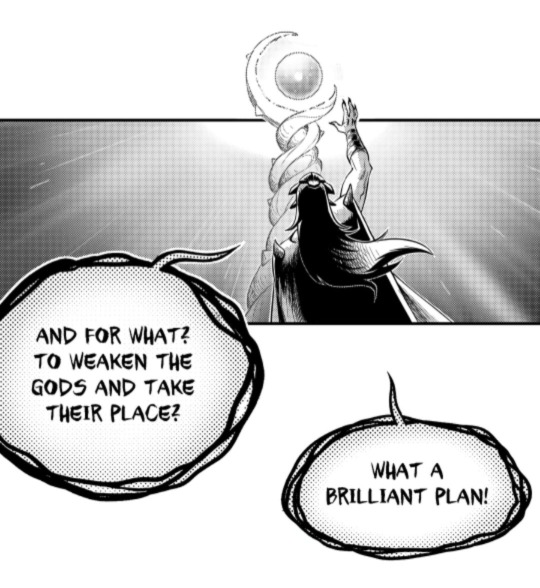
....Yeah, that was on Oropo, but I see why he'd blame Yugo too.
But besides me saying how much I believe most of what Grougalorasalar says, it's time I talk about the parts that I don't agree with.
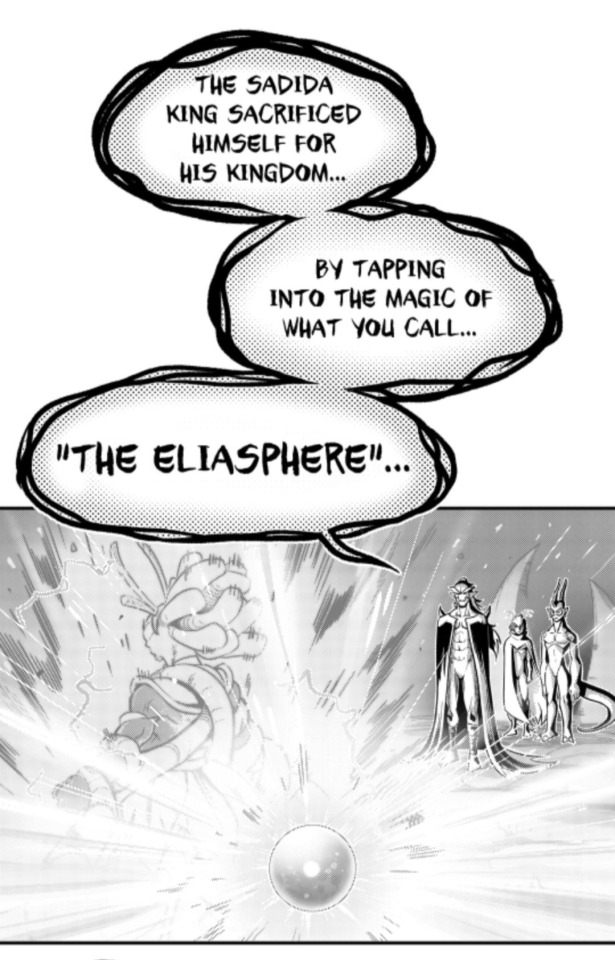
The first is by saying that Armand's death was indirectly caused by Yugo because he brought the Eliasphere into this.
When that wasn't technically true.
When Yugo returned to the Sadida Kingdom, he presented the Eliasphere and specifically warned everyone not to use its power excessively, as doing so could lead to death. Armand was present during this explanation and understood the risks involved. He ultimately made the difficult decision to sacrifice himself for his people by harnessing the magic of the artifact.
It was Armand's own choice to have gone out like that. Yugo had nothing to do with it.
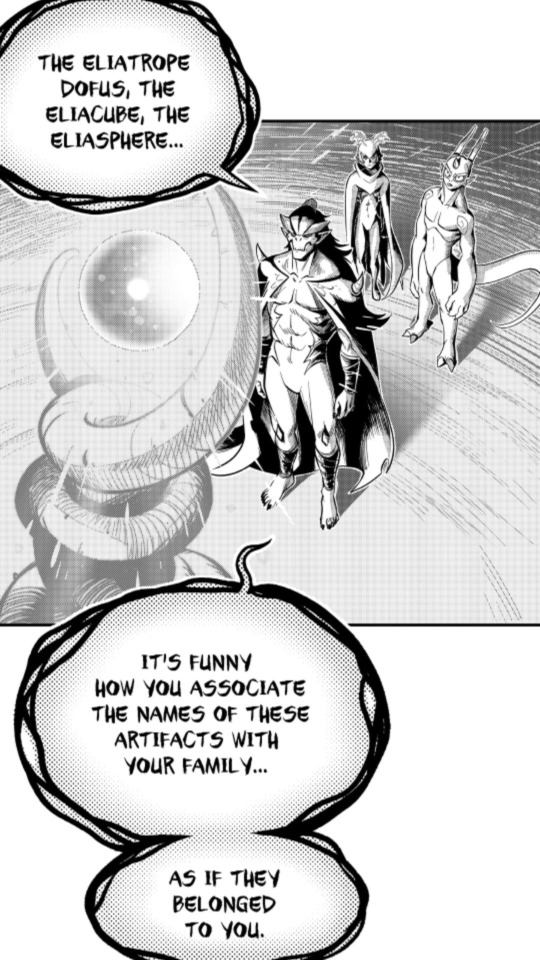
And the second is by saying that all of the artifacts that Grougalorasalar listed don't belong to the eliatropes.
I do agree that the Eliacube and the Eliasphere do not belong to them and should have never been touched in the first place.
But the eliatrope dofus?? Seriously????
Grougalorasalar, come on, are you being for real?
These dofus are literally the spawning eggs for the primordial eliatropes. That's literally their checkpoint savings, so the eggs obviously belong to them!
I think my guy was way into his monologue that he forgot that key detail.
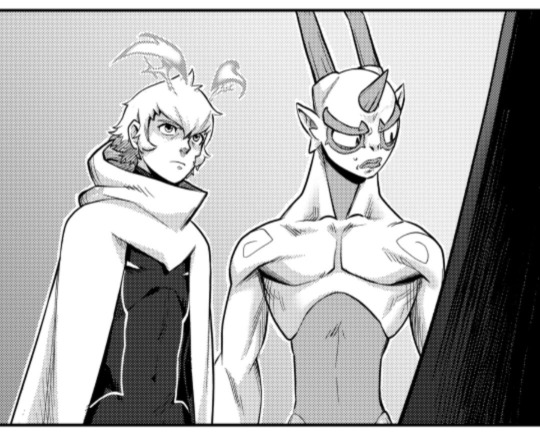
These two do NOT look okay and I'm loving it.
BUT WAIT GUYS WE'RE BACK TO THE REAL WORLD!!!
LOOK AT AMALIA RUNNING TO YUGO OMG SHE'S SUCH A GIRLBOSS SOMEONE PLEASE I WANT THEM ‼️‼️‼️❤️❤️❤️❤️❤️
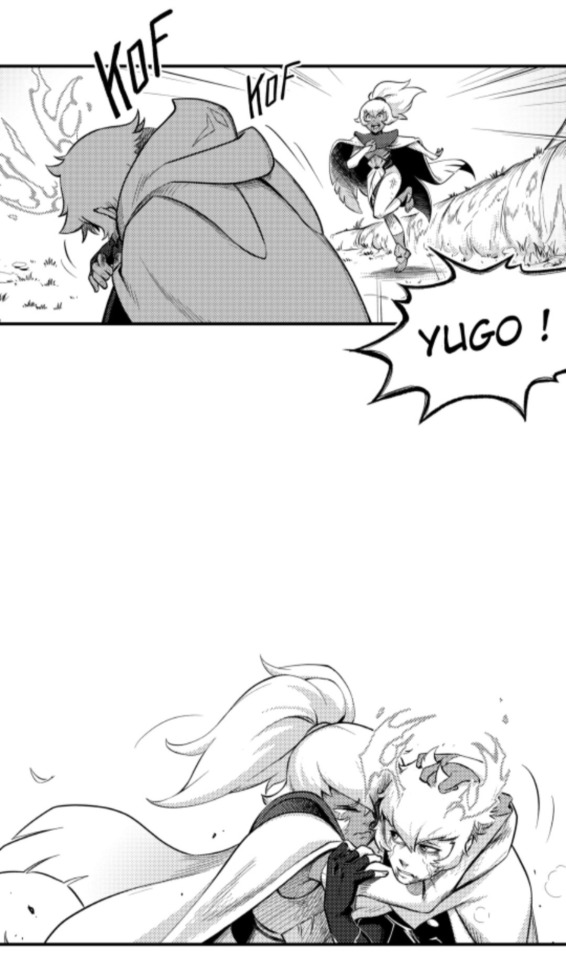
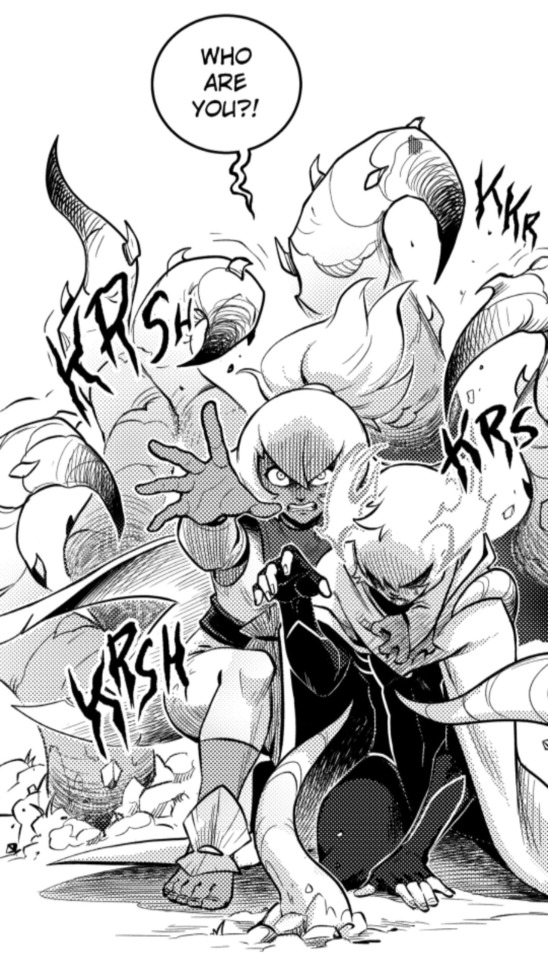
Look at how tightly her arms are wrapped around him...🥺🥺🥺 She's crying omg plz no babygirl it's okay your husband's alive and took it well omg- 😣😣
The way she completely loses it when she sees him in pain means the world to me. She would do anything for him 😭😭💗💗 How many times has she gone on the attack when Yugo has been injured??!!!? ❤️❤️❤️❤️ SHE EVEN HAD THAT HABIT BACK IN SEASONS 1-2 😫😫❤️🔥❤️🔥❤️🔥❤️🔥❤️🔥❤️🔥
As soon as Grougalorasalar takes them back, that damn belladone poison is now apparently subsiding and fading away on its own. Usually, the poison just immediately kills the person who swallows it but in Yugo and Adamai's case, it just fades away when their bodies are just being injured by it and nothing more. ✨️ Demigod stuff ✨️
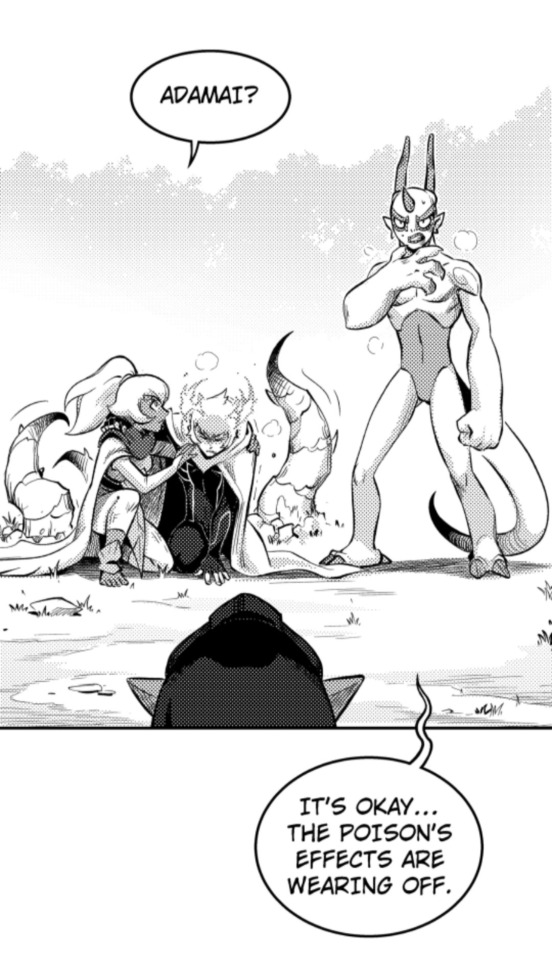
Alright, here is where we finally arrive at the scene that sparked a major discussion in the chapter comments.
And that was regarding the fact that Grougalorasalar was also seen carrying his own primordial dofus.
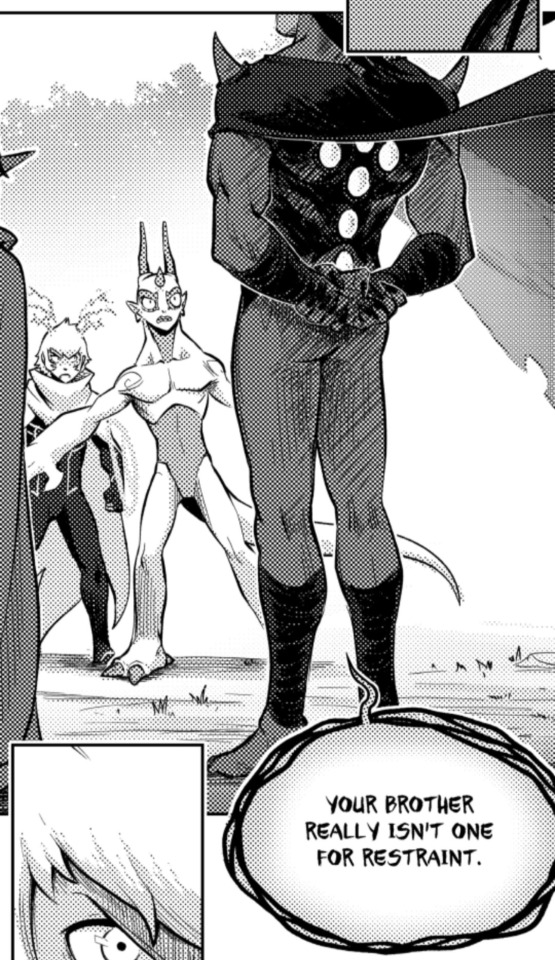
Many people have criticized that he shouldn't have been wearing the dofus while blaming Yugo for all the casualties that he caused while using the eliatrope dofus.
But I don't really think there needs to be a discussion.
I really love Yugo but Grougalorasalar was completely in the right for wearing them.
He knew that Yugo was the type to strike when something doesn't go his way and when he feels like he's being challenged. So did you really think that Grougalorasalar wasn't going to arm himself in case something went bad during his explanation? Or even when he would admit that he tried poisoning Yugo and his wife?
Like the reason why he was even armed with the dofus to begin with was because he knew there was a good chance Yugo could have attacked him with his own ones.
And it turned out that his hunch was right.
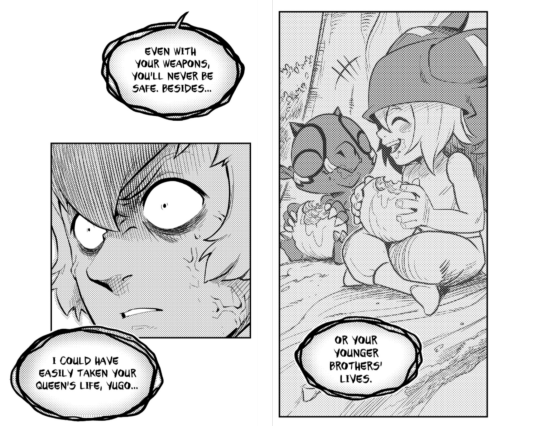
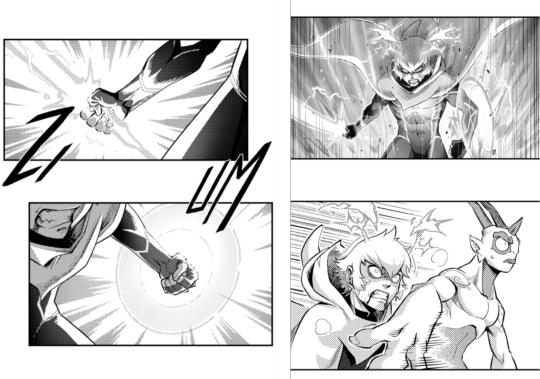
Yugo almost did but got stopped by Adamai (just in time too). So Grougalorasalar's decision was completely justifiable.
But despite that, I'll have to disagree on another one of Grougalorasalar's decisions: demanding to take away the eliatrope dofus AND the Eliasphere.
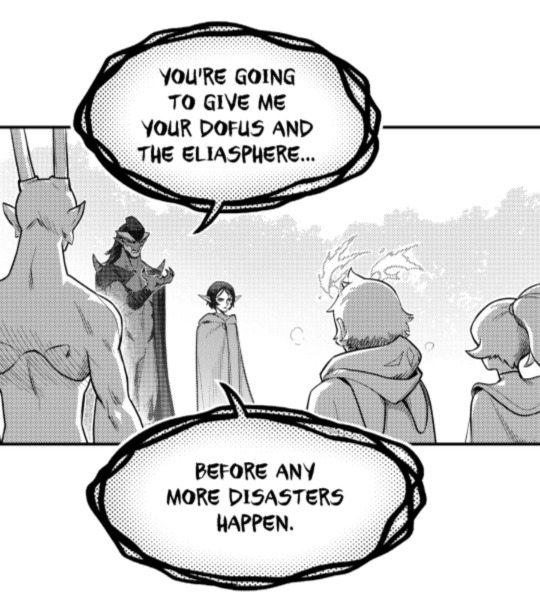
Like I said before, Yugo and Adamai cannot give him the eliatrope dofus because those are where they rest after death and leave to get reborn. Those literally belong to them. The goddess eliatrope created them with these dofus.
While I agree that he was right to tell Yugo and Adamai that the Eliasphere does not belong to them, it's important to note that the artifact cannot leave their possession, even if they wanted it to. Rotalström, the dragon that Armand defeated, is still technically alive but currently dormant. The Eliasphere is the only artifact capable of keeping it subdued. So, if there ever comes a time when the necromantic dragon awakens, the Eliasphere would be the first artifact used against it.
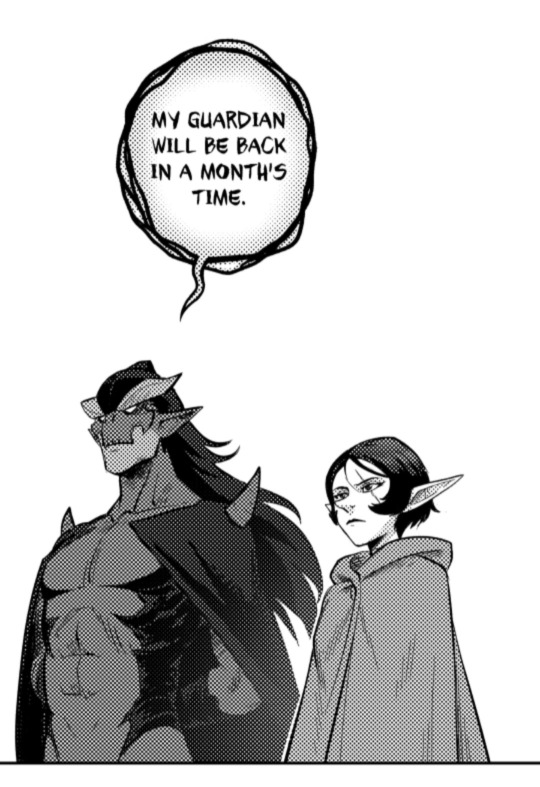
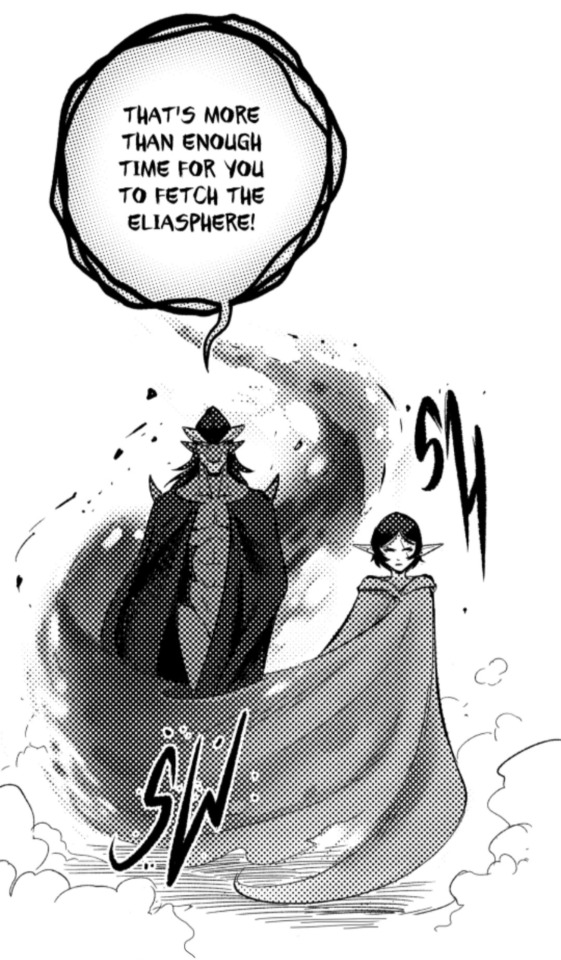
...So is Julith naked under that cloak or...? Did she get clothes before coming here with Grougalorasalar? Cuz when she woke up, he only gave her a cloak....
(Also I love how he still considers her his guardian after all these centuries that she's been dead. She hasn't been seen talking once until now. Is pookie bear feeling okay? What is she thinking about...)
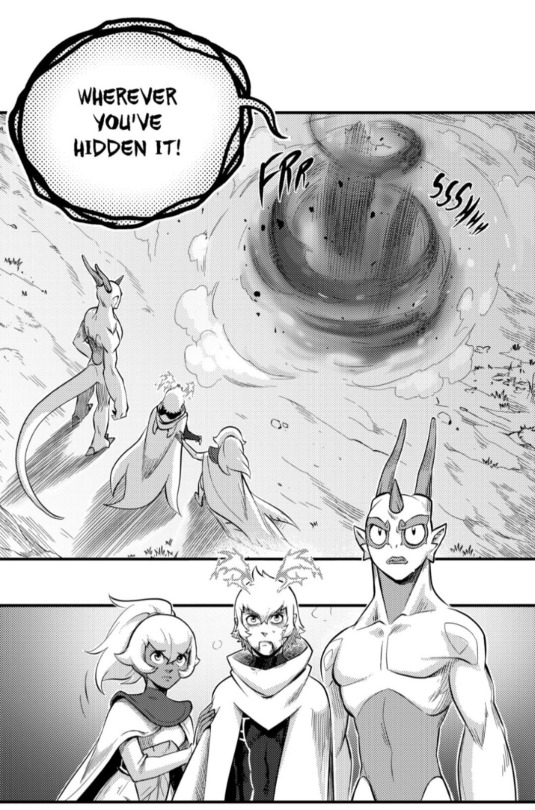
Well now we know that these three goobers hid the Eliasphere somewhere and didn't kept it where we last saw it in season 4's last episode...Good.
They only have one month before Julith comes back omg this makes me wonder if they're even gonna go along with the deal. If not, then that probably means we'll either have Yugo or Amalia fight Julith. Or maybe they'll fight her together lol
This is unrelated, but I do hope that we get to see Adamai's full dragon form in the second volume or in the future ones. Because if the manga that comes between season 2 and the ovas had him use his full form on some occasions, then they should be able to do the same thing here.
#im nervous#but im excited#but im nervous?#wakfu#ankama#krosmoz#the great wave#the great wave manga#wakfu manga#wakfu the great wave manga#wakfu the great wave#wakfu the great wave volume 2#the great wave volume 2#wakfu review#wakfu reviews
60 notes
·
View notes
Note
Something I’ve been thinking about a lot is how Jowd and Yomiel are parallel to each other. They’re both so stuck in worldviews that are blatantly wrong- Jowd thinking everything is his fault, and Yomiel thinking everything is the fault of everyone BUT him. To an outside observer, both these views are totally stupid, but the two of them feel like they HAVE to believe it or else everything they’re doing will be for nothing. If jowd is wrong, that means kamila did it, and he can’t let himself believe his kid could do that, it would destroy him. He’s so willing to take on the guilt because he feels responsible for not stopping the tragedy- even when it was literally impossible for him to foresee or stop. If Yomiel is wrong, then it means that literally everything he’s been doing since dying is useless and he’s the one responsible for the deaths of both Sissels, and he can’t believe that or he’ll sink even further down. So the two of them both push on, warping the truth until it suits their narratives, both of which are steeped in self-hatred. It’s a good thing they never met up before their respective character developments- like Yomiel said, Jowd would have loved to be executed by his own daughter. Sorry for talking so much I just think they’re fascinating!!! I love ghost trick!!!
No need to apologize, I love hearing other people's Ghost Trick takes/analysis! Especially along these lines!
This specific parallel is def one I've thought about too, and you put it very well! For me, it all comes back to the set of questions I posed in this post as being at the core of Ghost Trick's story:
1. When something terrible happens to you, what do you do with that trauma? 2. When you do something terrible, when you make a terrible mistake, what do you do with that guilt?
Like you said, Jowd is a person who, in response to both questions, internalizes all the blame; whereas Yomiel, in response to both (pre Chapter 17), externalizes all his hatred. And yes, from an outside perspective they're kind of ridiculous — just look at how many chatters in the secret sleepover society streams (and other lps I've watched) have been reacting to Jowd as a character.
But one of the things fiction arguably exists for is to present characters that take such ideas to such extremes for the sake of exploring those questions and making a greater point; it's the premise "What if there was guy who ___? Wouldn't that be fucked up or what?". And for me (and a lot of people, clearly) Ghost Trick succeeds in getting you to take those characters seriously, because they and the people around them take their own stakes seriously, while ultimately making it clear that their responses were irrational.
...And hey, while I'm here:
Cabanela's answer to the second question is to bury all evidence of it, to Not Think About It, to become (or at least project the image of) a person who would never make that kind of mistake. Meanwhile, his answer to the first question, if we say the terrible thing in question is his best friend confessing to killing his wife and asking to be executed, is to dedicate himself to trying to undo it, to set things right, everything else in his life be damned.
These answers are "better" than Jowd's and Yomiel's — they certainly cause less extreme collateral damage — but they still aren't ideal. After all, Ghost Trick is a game that highly values the forging/maintaining of bonds with others and being honest/open with them as the key to both parties' success. It's what saves the day in the end. Without Sissel, all Cabanela's efforts to save Jowd and protect Lynne would have amounted to nothing.
No, the person with the "correct" answer is Lynne. She doesn't really have to grapple with the second question (which is maybe my personal biggest disappointment with her character), but her answer to the first question is clear: Become the kind of person who prevents such things from happening to others, or who can be the one to help them when it does. Always believe in people, and in the ability of things to turn out right.
Now, it must be said: the reason she comes to this answer is not because she was born a perfect idealist. It's because, in that worst moment of her life, someone was there to save and then reassure her; to inspire her. Jowd.
It's her truth, but it's not, say, Yomiel's.
But. It's a truth that inspires the rest of the cast (Sissel and Jowd primarily). And, because of her insistence in it, they're able to go back, defy fate, and make it The Truth of the narrative.
(Sissel similarly only has to really deal with the first question because Reasons, and his answer evolves over the course of the game, from "focus on the wrong that was done to you and what you can do to make yourself feel better about it above everything and everyone else" (doesn't that sound familiar?) to be more aligned with Lynne: "use what you learned/gained from that unfortunate occurrence to help others". And Missile is basically on the "right" wavelength the whole time, which is why everyone agrees he's the Bestest Boy.)
#ghost trick#ghost trick: phantom detective#ghost trick spoilers#yomiel#jowd#cabanela#lynne#sissel#missile#ask time!#analysis#tl;dr all the main characters in ghost trick have a unique perspective on (at least one of) these 2 questions that make up the game's core#and their answers illuminate the Game's perspective from different angles#it's so cool! and so good!
80 notes
·
View notes
Note
I personally believe that Snape AND the Marauders are assholes. You can't deny the trauma Snape faced at the hands of the Marauders, between the murder attempt and the torment, but that still doesn't change Snape's actions later in life. It doesn't change how he joined a murder cult, it doesn't change his refusal to get over his trauma before being around children, it doesn't change his blatant bias against 1/4 of his students, it doesn't change his hatred of a GOD DAMN 11 YEAR OLD just because he looks like his father, and it doesn't change how he doesn't bother to hide any of it. I don't know if I'm just biased because I have some really bad trauma involving teachers like him, but I feel like trauma doesn't justify treating children like that.
So what?
I mean, what does that have to do with the Marauders ruining his life? What do the actions someone commits after they’ve suffered abuse have to do with it? Why do you always try to invalidate the abuse he went through by bringing up what he did or didn’t do after that abuse happened?
We’re not judging or talking about what he did years later, when he got involved with an extremist group—which (by the way) he left after two or three years and then spent the rest of his life serving the “greater good,” giving up his own life to atone for his mistakes. To the point of risking his life multiple times, saving the kids multiple times, serving as a double agent, putting himself directly in the line of fire, accepting that everyone would see him as the worst traitor and the most despicable person imaginable for killing Dumbledore, and ultimately literally dying for the cause. All of that without ever wanting anyone to know his true intentions or give him credit for what he had done. That’s not what we’re talking about.
We’re also not talking about the fact that he was an adult with a horrible personality and a terrible temper he couldn’t manage (ironically, thanks to the BULLYING he suffered), or that he clearly never should have been a teacher in the first place because it’s obvious he didn’t like it and didn’t like kids. Nor are we talking about how maybe you should blame Dumbledore for forcing him into that position and never reprimanding him. Or how, if you think he’s so bad, maybe you should also blame the other adults who never called him out on his behavior. No, we’re not judging the fact that canonically he only had issues with Harry, his two friends, and Neville—who would’ve gotten on the nerves of any average adult—while canonically the rest of the students didn’t have major issues with him beyond seeing him as a very strict and demanding teacher. That’s not what we’re talking about. That’s another topic, another point of discussion.
We’re talking about 11-year-old Severus calmly talking with his best friend on the train and a rich kid from a powerful family showing up out of nowhere to mock him for his preferences FOR NO REASON. We’re talking about that kid and his friends, in clear positions of social and economic power, going after him whenever they could. We’re talking about Sirius Black committing attempted murder against him with zero consequences or repercussions on his record or in his life. We’re talking about James Potter deciding to strip him and choke him publicly simply because his friend Sirius was BORED. We’re talking about Sirius and James cornering him in the schoolyard and attacking him because THEY FELT LIKE IT. We’re talking about James Potter—the rich kid, the pureblood, the one from a powerful and prestigious family—mocking a poor half-blood kid from a working-class neighborhood for wearing old underwear. We’re talking about James Potter saying he bullied him “just for existing.” That’s what we’re talking about—the bullying he endured before all that, what happened before that bullying was ironically crucial in determining the path his life would take years later. That’s what we’re discussing.
And if you don’t want to discuss it because you have no way to coherently excuse James’s actions but still feel the overwhelming need to hate Snape, that’s not my problem. Becoming a terrible adult doesn’t erase the fact that you were abused, and it doesn’t mean your abusers weren’t pieces of trash. That’s not how criminal acts work. A criminal act doesn’t get erased just because the victim turns out to be a better or worse person in the future—it’s still a specific case.
#severus snape#pro severus snape#severus snape defense#pro snape#james potter#james potter was a bully#james potter was an abusive privileged brat#the marauders era#marauders era#the marauders#the marauders map#marauders#marauders map#Sirius black
20 notes
·
View notes
Text
The similiar struggles of Merida & Hiccup
Just my two cents because I love talking these movies. I find it interesting how both Merida and Hiccup share similiar conflicts/themes in their movies. They both feel pressured to become leader figures by their parents, while also stubbornly sticking to their own ideals. Merida is trained by her strict mom to become the perfect princess, and is also expected to carry out her duties through marriage. Hiccup in HTTYD2 is expected to become the next chief by his dad while Hiccup himself feels it's not for him and he can't meet the expectations. They both have other dreams and yearn to keep their freedoms. Merida wants to live her life like she wants to, and Hiccup wants to keep exploring and spreading his findings about dragons. They also have parents that at some point have refused to listen to them.
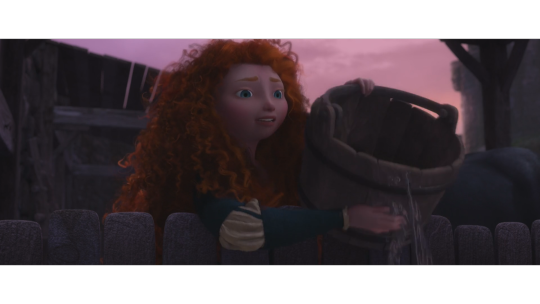
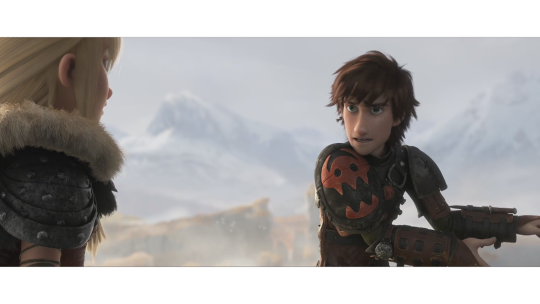
They also act in defiance to their families in order to maintain their own ideals and freedoms, wanting to do things their way instead of traditions. Merida argues against her mom, breaks the clan traditions by shooting for her own hand, and asks the witch for help to "change her mom" to agree to Merida's views. This ends up endangering her mother and the peace between the clans. Hiccup in turn refuses to listen to his parents about Drago, both who know him much better than Hiccup. Because Hiccup keeps believing anyone can change, that if he's just given the chance he can make it happen and everyone else is just hindering him in their warmongering blindness. Hiccup believes so strongly in his position as the pacifist peacemaker that he doesn't budge until it's too late. Neither Merida nor Hiccup really stops to think of the possible consiquences of their actions, they only see the positive outcomes. They feel like they're not being listened to, but they also don't listen to others either.
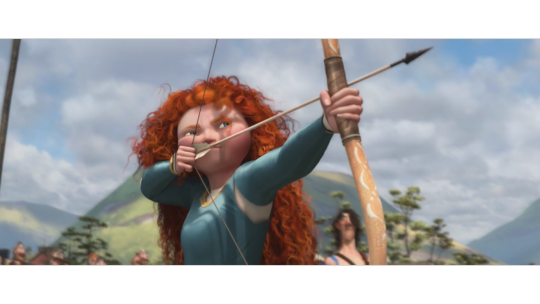
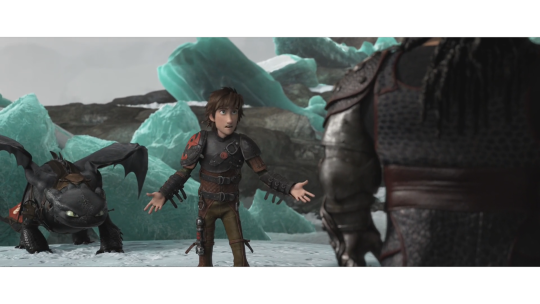
So they both try to escape the expectations and restrictions put on them by actively defying and being stubborn about it, that it ends up endangering everyone. The main difference is, that while Merida gets a second change and has everything fixed in the end, Hiccup ends up paying the heavy price for his mistakes.
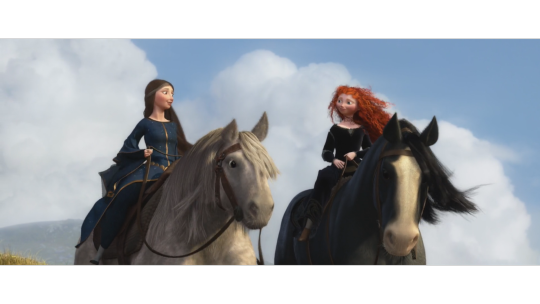
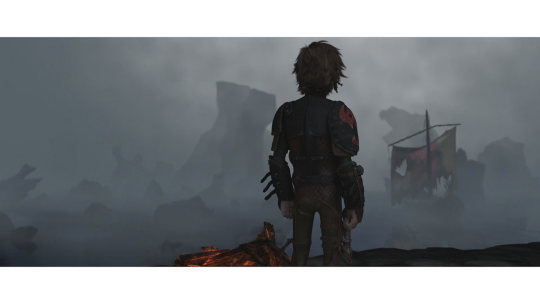
Merida's actions get her mom turned into a bear and almost loses her completely. In the end when all seems lost Merida finally admits her fault aloud and to herself, owning up to her mistakes. Before that she also admits her careless actions against the clans and is ready to accept her duties as the princess. Merida finally sees the bigger picture outside her own point of view, that she's in a position where she simply can't think only about herself. She manages to reverse the spell and fix her relationship with her mom, who has also come to see the error in her own ways, thus ending things perfect.
Hiccup's mistakes sadly don't get as happy resolve as his stubborness ultimately ends up getting his dad killed. It's the cruel wake up call to Hiccup, how some people are simply beyond help and fighting them is the only way. It's what his dad had tried to tell him throughout the movie. Had he listened to his parents, things might have ended better, and he has to carry this guilt with him probably his whole life. Drago is the real villain and culprit, but Hiccup did play a part in how everything turned out. His part is more nuanced than Merida's, who is more clearly at fault in Brave along with her mom. After Stoick's death, Hiccup has no choice but to face the reality, own to his mistakes by stopping Drago and accept his duty as the chief. It was a harsh lesson for him, that sometimes you just can't force things to go your way, but maybe it was one he needed before becoming the leader for his tribe. Just like Merida needed to face hers to fix everything around her and correct her ways.
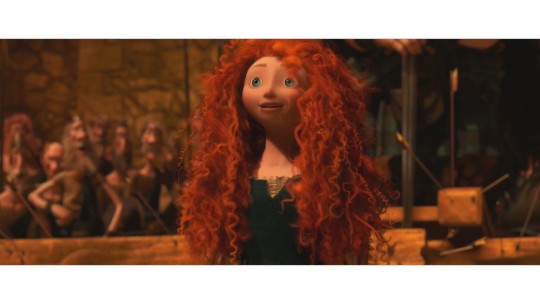
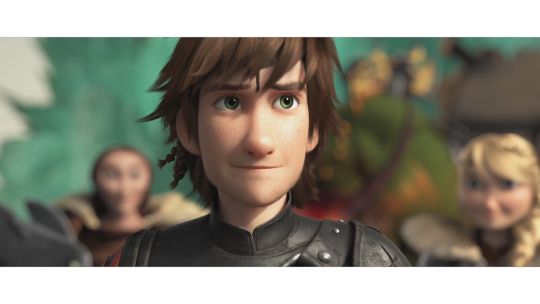
So yeah, like said I find it interesting how Merida and Hiccup's stories and their character growths follow similiar themes. I'm glad Merida got her happy ending, but damn now I really want to give Hiccup a hug! ;u;
#rotbtd#rotbtd edits#brave#httyd#merida#hiccup#random ramblings#analysis#just my thoughts lol feel free to disagree#reason i didnt use httyd1 is because#i feel in that one it's not really hiccup whose actions and views cause conflicts#but instead it's the people and world around him that are wrong and have to change
120 notes
·
View notes
Text
Every Natasha Pulley book ever:
Bulky Man is unintentionally bulky, he's just sort of stronger than everyone because that's the nature of his life. Everyone assumes Bulky Man is violent because of his girth, but he actually hates violence and is really just the nicest little dude inside.
Fragile Dude is little and/or easily breakable. Fragile Dude is brilliant and/or powerful. He too is pretty nice, but he's probably had to use his intellect and/or power to commit some kind of atrocity in the past that he will be attempting to keep secret over the course of the story. This will be revealed 3/4 of the way through the book, but the circumstances surrounding the atrocity will be so horrible that everyone will agree it was probably justified.
Bulky Man and Fragile Dude are both dissatisfied with their lives to some extent.
Bulky Man and Fragile Dude meet through a series of unlikely and often unfortunate events.
Bulky Man and Fragile Dude are forced to work together in some capacity.
Bulky Man and Fragile Dude are both a little bit afraid of the other, but there's also some quality that they really like or respect in the other nonetheless.
Bulky Man and Fragile Dude continue to work together, but now they're starting to reluctantly take a liking to the other. Neither of them realize that the other actually likes them though.
Bulky Man and Fragile Dude have had to help each other out of some sticky situations by now. They're clearly head over heels in love these days, but circumstance and/or society is keeping them from acknowledging it. People have started to hint to Bulky Man that Fragile Dude is actually super shady, so you better watch your back. Bulky Man doesn't really care that much at this point, but he's like, I guess I better look into these accusations.
(Some kind of cute but unusually intelligent animal is usually involved with the plot and/or their relationship by this point. Also, there's at least one loveable child character that usually helps the characters bond.)
Bulky Man and Fragile Dude have a nice, cheerful break from all of the traumatic events they've been experiencing, which inevitably ends in a romantic encounter.
Because of communication issues or societal issues, both chraracters still don't actually believe the other character loves them, and they both act like it was just a one off thing and an accident and that everything is totally fine.
Things are awkward between Bulky Man and Fragile Dude, but the traumatic events have really fired up again so they still have to work together. Plus, they're both just that desperate to be together, even though they think the other character hates them now.
Bulky Man finds out Fragile Dude's secret, but usually he doesn't get it quite right or he's missing some essential information. Bulky Man is temporarily horrified of Fragile Dude. Bulky Man chides himself for being so desperate for affection that he fell in love with some kind of psycho.
At this point, either Bulky Man makes a stupid mistake while being horrified or circumstances just happen to suddenly get a lot worse or both. Bulky Man and Fragile Dude are physically separated, often by force and some kind of authority. At some point in here, Bulky Man realizes he was wrong about Fragile Dude.
A slapdash plot is hatched to save the stolen love interest. Usually Bulky Man has to save Fragile Dude, but occassionally the script is flipped.
Ultimately, the stolen love interest is rescued, though it was a real close thing at some point. The Day is saved, usually through murder/s, caused by a combination of Bulky Man reluctantly bashing some heads in and Fragile Dude using his wits and/or power to get the right people killed. Often, our protagonists are then forced to straight up run away from the Bad Times, leaving their lives and families behind. (The loveable child from earlier will either be tragically left behind or adopted by the now happy couple.)
Bulky Man and Fragile Dude are a little bit sad at the things they've lost along the way, but mostly they're going to live happily ever after.
#natasha pulley#the watchmaker of filigree street#The lost future of pepperharrow#the bedlam stacks#the kingdoms#the half life of valery k#the mars house#thaniel steepleton#Keita mori#Merrick tremayne#Raphael (the bedlam stacks)#Joe tournier#missouri kite#Valery kolkhanov#Shenkov#January stirling#Aubrey gale#River gale#books#bookblr#mine
91 notes
·
View notes
Note
Do you think Eiffel reconnects with his kid when he gets back? Do you think the crew tells him about his past mistakes or offer him the ultimate forgiveness of not having to remember his darkest times?
i think... that's complicated. he wants to, of course, but what he put anne through was traumatic, and she thinks he's dead. that's a hard enough situation on its own, and if he showed up and tried to make amends without his memories? i think it would make things much worse. even if he does get his memories back, i think his initial attempt to reconnect will probably not go the way he's hoping. eiffel doesn't take rejection well, and has a hard time with things he can't fix. i hope he can be in her life again someday, but ultimately that's her choice, and even in the best case scenario it's going to take time, he's going to have to learn how to back off and give her space, and things will never be the way they were. i believe eiffel was a fun and loving dad, but that doesn't make him a responsible one, and kate was clearly always anne's primary caregiver. she may even have a stepdad now. he's going to have to learn to live with the uncertainty of his place in her life, and really sit with the hurt he caused her (without making it about himself) in order for it to work.
which leads into your other question: they have to tell him. he heard a bunch of his old logs and knows there are people he needs to try to make amends with, so he already knows at least some of it, but he needs to know. i don't think it's forgiveness or kindness to leave him in the dark about it. it calls back to shut up and listen + constructive criticism: a lot of eiffel's arc is about learning to live with his mistakes in a constructive way, instead of closing himself off, trying to escape from himself, and denying the possibility of growth.
#thank you for asking!! i'm finally getting to asks again. slowly#also if she was ten-ish by the end of the show and six-ish when the accident happened... that's a lot of time he missed.#on top of everything else.#asks
18 notes
·
View notes
Text
Spirk Meta: Connecting Star Trek SNW & TOS
I'm going to try to connect TOS and SNW's character arcs for Kirk and Spock's relationship with one another. This is part analysis and part prediction of where the writers are headed in shaping SNW into the TOS narrative.
With the most recent SNW episode, I think it's really fascinating that Spock is coping with the consequences of his attraction to Chapel and infidelity to T'Pring, while Kirk reacts to his attraction to La'an by showing a strong sense of loyalty to Carol.
I've been discussing with friends and they believe the two situations aren't comparable. However, I believe they're not only comparable, the writers completely intended them to be compared.
Spock has always served as a foil to Kirk. If you've seen TOS, you know this is true. Spock is logical, Kirk is unpredictable, and so forth. I don't really need to go into details about this, it's been explained to death. For me, it says a lot that in SNW E9, Spock is uncertain of who he is as a person and Kirk is uncertain of who he's meant to become as a commander.
Kirk has his mind on command, hence his discussion with Una, where he concludes that he needs to connect with people. That's the point of that song. Meanwhile, Spock's takeaway from his song is that he needs to specifically stop connecting with others on a personal level because it was a mistake to do so. It's a very internal-facing narrative, as it should be. But as we know, it doesn't work out that easy. For either of them. Ultimately, Spock does connect to people and finds himself emotionally compromised, and Kirk has trouble getting close to others. But Kirk is looking outward for answers, to other people, while Spock looks inward. To me, this extends to how they cope with difficult relationships, problems, and each other.
Kirk, like Spock, is attracted to someone he's not in a relationship with in this season. He clearly feels something with La'an but explicitly chooses not to pursue it seriously because he's in a relationship (some of the time) with Carol Marcus, who is having his child. Spock, on the other hand, says he wants to feel at this time. He doesn't want to let his relationship get in the way of experiencing something new with Christine Chapel, even at the detriment of his core beliefs. The really interesting thing about this is that these two characters arrive at the same conclusion even by making different choices. They both end up incredibly lonely, a major thematic arc for both men throughout TOS.
How they react at these crucial moments in SNW is a representation of their priorities in relationships, in life, and how they even become with one another. Kirk is married to the idea of command, costing him his relationships to other people. Spock is so deeply internally focused that he only has a few real friends by the time TOS rolls around, and can't accept that he cares about them, always couching it in terms of duty and obligation.
Spock essentially thinks, I need to not get close to people because I'll be hurt by those people. Kirk thinks, I need to get close to people where it matters, for command, but not so close that I'll hurt them. This ends up with both of them being painfully reticent to connect with anyone, to the point where in The Final Frontier, Kirk thinks he has no family.
MCCOY: It's a mystery what draws us together. All that time in space getting on each other's nerves and what do we do when shore leave comes along? We spend it together. Other people have families.
KIRK: Other people, Bones. Not us.
He eventually changes his mind by the end of the film, but you can see that this theme of loneliness goes all the way from SNW to nearly the end of their lives. Kirk's conclusion at the end of the film is that McCoy and Spock are his family.
But we see this idea of loneliness repeat so often that Kirk has a several ex girlfriends in TOS show up, all on good terms with him except one who we won't talk about here. Spock, on the other hand, has mostly closed himself off to relationships of all kinds by TOS, even shaming himself for whatever it is he actually feels for Jim, who is his best friend at that point. And they both fight this loneliness aggressively in TOS and the films. Spock insists he feels shame for his friendship with Kirk, Kirk feels like his ship owns him and he can't have anyone in his life. This excerpt from The Naked Time, which I abridged significantly since there was a lot of interspersed discussion about physics, is revealing:
SPOCK: My mother. I could never tell her I loved her. An Earth woman, living on a planet where love, emotion, is bad taste. I respected my father, our customs. I was ashamed of my Earth blood. Jim, when I feel friendship for you, I'm ashamed. Understand, Jim. I've spent a whole lifetime learning to hide my feelings. KIRK: I've got it, the disease. Love. You're better off without it, and I'm better off without mine. This vessel, I give, she takes. She won't permit me my life. I've got to live hers. I have a beautiful yeoman. Have you noticed her, Mister Spock? You're allowed to notice her. The Captain's not permitted. Now I know why it's called she. Flesh woman to touch, to hold. A beach to walk on. A few days, no braid on my shoulder.
They're both completely focused on their inability to love people. Spock is focused on talking about how he can't because of his identity, and Kirk is talking about how he can't because of his job. We even see Spock turn down an appeal from Chapel, as Chapel turns him down here. These two episodes have major parallels.
Just like in Subspace Rhapsody, Spock is thinking of himself, his faults, his issues, and Kirk is thinking about how he never stays in one place long enough to love someone. I think this sense of inability to experience deep love is actually setting up their friendship arc. Obviously, they eventually do love each other (in some way or the other). But it begins at what is clearly friendship, and notably, Kirk is eventually able to look past his marriage to command for Spock, and Spock is able to look past his reticence to relationships for Kirk (see Amok Time).
What's of interest to me is that we don't know how Spock and Kirk become close in the first place, but we will. It's clear they're very close friends by TOS, but in SNW currently, we haven't got an inkling of how that forms. My take on it is that it forms because of their respective struggles to connect with people. They're both struggling in precisely the same way: neither of them thinks they can or should get too close to people. For one another, they act as the only person they're able to completely let their guard down with. And that's possibly how they get close; that's the basis on which their relationship forms. They trust each other. Because they think they're not allowed to have or experience love, they end up more or less using one another as a stand-in for that need. In doing so, it brings us full circle. Kirk and Carol have a conversation about their relationship briefly in The Wrath of Khan.
KIRK: I did what you wanted. I stayed away. Why didn't you tell him? CAROL: How can you ask me that? Were we together? Were we going to be? You had your world and I had mine. And I wanted him in mine, not chasing through the universe with his father. Actually, he's a lot like you. In many ways. Please tell me what you're feeling. KIRK: There's a man out there I haven't seen in fifteen years who's trying to kill me. You show me a son that'd be happy to help him. My son. My life that could have been, and wasn't. And what am I feeling? Old. Worn out.
Kirk is terrified of aging. In this film, his past has come knocking, the same past SNW is exploring now. He's terrified of growing old and he's terrified he made the wrong decision when he was younger. I'd argue that that's because it's led to him feeling deeply alone, to the point where McCoy says they're treating his birthday like a funeral. Kirk not only feels like he belongs out in space because it's where he's meant to be, but because he doesn't feel so deeply alone, so much like a fish out of water, when he's out there adventuring. So he second guesses himself here: what have my choices cost me? Should I have not gone on to become who I am?
And the answer to that for him is no. This all ties together when Spock dies to save the ship at the end of this film. It's only in a few places in TOS and then finally here where Spock is able to talk openly about friendship and love:
SPOCK: I have been and always shall be your friend. Live long and prosper.
Kirk is devastated but while grieving, he can't help but feel young. And even then, feeling young isn't enough, because he can't stand not being in control, which we see in the next several films. He essentially can't handle life without command or without Spock.
SNW is attempting to bring us full circle on The Wrath of Khan and its cast. I guess what I'm trying to say here is that the character arcs we will eventually be given by the writers of SNW between Kirk and Spock is completely bookended by their feelings of loneliness, self doubt, and connection with others beginning from this episode through the TOS films. It's extremely interesting that they choose to do this on the SNW end by showing us where Kirk and Spock are both failing in their respective relationships with others and how they grow into that with one another, only to experience violent ups and downs throughout the films as they finally try to come to terms with who they really are as people, and who they really are as friends.
I'm interested to see how that will begin from season 3 onwards.
#star trek#strange new worlds#star trek strange new worlds#st snw#st: snw#snw season 2#snw#star trek tos#st tos#tos#mr spock#spock#kirk x spock#spock/kirk#jim kirk#james t kirk#james kirk#star trek the original series#Spirk#space husbands#la'an noonien singh#christine chapel#subspace rhapsody#k/s#the premise
149 notes
·
View notes
Text
farleigh start thoughts
this is going to be a very random, very eclectic post. i just wanted to share some stuff that i can't figure out how to post independently. some headcanons, some commentary, some references... who knows. probably just a lot of yabbering.
"keep the rain" by searows. dude. just listen to the lyrics, i swear.
i was wondering about what the cattons really give farleigh. there's kind of... endless possibilities. his family in america is emotionally neglectful, but how do the cattons differ? i can imagine that having felix and venetia, two people of similar ages that he can glue himself to, is important to him. i also think that frederica start is an overlooked aspect of farleigh's character. e.i. he needs to have some semblance of closeness with the cattons if he has a chance at convincing them to financially support his mom. i think his ultimate mistake when confronting felix was perhaps centering himself, when the conversation was originally about frederica. although farleigh needed to finally say what he knew all along; he's different, and he's being treated differently because of it. i digress; farleigh wants companionship, a loud and distracting lifestyle, the security that only wealth can give you, and the possibility of helping his mom. that's how i sum it up, at least.
although farleigh is prone to escapism (into his wealth, into drugs, into his social life, into the games he plays), he doesn't seem as committed to cognitive dissociation as the rest of the cattons. i don't think farleigh is deluded by the wealth and power he has access to; i actually think it's the opposite. he is so hyper-vigilant of what he can lose that he's entirely aware that he doesn't know how to exist without wealth. the rest of the cattons have convinced themselves that wealth isn't an inherent part of them (elspeth with her odd anecdotes that imply she's a worldly woman, felix with his down-to-earth "i'm beyond classism" attitude, venetia with her general boredom of wealth and everything attached to wealth). farleigh never has that attitude. he knows exactly who he is with wealth, and he's terrified of what he will face without wealth. how would he cope with his sometimes-debilitating otherness? how would he have any power, any control, if not wealth and status? (this is a warped perception of reality, but i believe that's the perspective that comes with omnipresent wealth since you were born).
i think that farleigh would smother his room in pictures. i mean all kinds of media. films he likes, artists he likes (beyonce, justin timberlake, gwen stefani, aaliyah, madonna), pictures of new york, polaroids, photo booth strips, favorite travel locations (greece, italy, LA, germany, whatever), chad from hsm because that's his hair inspo, vogue magazine clippings- jesus, dare i say... postcards? i'm picturing anything and everything. but let's say that farleigh is a very private person. i mean, he's a professional hider, secret keeper, "inside thoughts" kind of person. i'm imagining anything just slightly too personal would be kept in a box. maybe that same box he keeps his cocaine! family pictures, baby pictures, personal photography (would it be bold to imagine farleigh as a notorious street photographer?), old knick knacks like his first friendship bracelets or seashells he found on the beach. i'm getting carried away. farleigh seems like the type to consume, linger, consider. i feel like anyone who wears gucci loafers also has an immense amount of sentimental material.
farleigh doesn't like english food that much.
farleigh is clearly able to apply himself in an academic setting, if the tutoring session is anything to go by. he takes a gamble on whether spending time with people is more beneficial than actually doing his work, and maybe he's just a little bit bored by school. but at the same time, he listened to oliver's entire essay and counted each individual time that oliver said "thus." where the tutor wasn't even listening, farleigh made the choice to specifically comment on oliver's rhetorical content because he understands how to apply yourself academically, even if you've yet to get around to the actual assignment. so.
i think farleigh likes to read. clearly felix, vee, and farleigh all made an agreement to read harry potter together. but i'm also imagining farleigh as a sort of classic literature, historical drama, and romance type of reader. i just think he'd get a kick out of it. i imagine his myspace page genuinely contained moments where he shared book plot like it was school drama.
based on archie's information about how he was asked to audition for farleigh, i think that farleigh speaks to his mom less often and very casually. in a few of archie's interviews, he said he was asked to mimic a phone call with the character's mom while he talked about guys he slept with recently. i think farleigh learned to avoid attempting any substantial conversation with frederica from a fairly young age (also from what archie has said about farleigh's dynamic with his mom). there's a level of both maturity and immaturity to farleigh's relationship with frederica. frederica clings to youth and avoids traditional aspects of motherhood. farleigh had to meet her in this odd middle ground, speaking to her like a friend that's similar in age to him. i can imagine that very few people have had any genuine, serious, emotional conversations with farleigh. like archie has said, farleigh and felix's heated confrontation has never happened before. farleigh doesn't say shit about what he's feeling or thinking.
farleigh and the cattons is so GAH. familial but transactional, familial but not quite. the cattons resolutely ignore the massive elephant in the room that is their inability to let go of how they view farleigh. "dad felt so guilty that he agreed to pay for all of farleigh's education," which also implies that farleigh is only living with the cattons because james has roped himself into this odd situation where farleigh is being shipped to england for school. now that he kinda has to stay with them based on that one agreement, it would also be weird if the cattons didn't treat farleigh the same as felix and venetia. i'm getting carried away. supporting a family member isn't supposed to be on the basis of guilt or pity. there is supposed to be... love? like, c'mon. this makes farleigh's relationship with his cousins odd. venetia believes farleigh is spoiled ("talk about biting the hand"), felix agrees that farleigh is there for entertainment. both comments didn't sit very well with me. the normal family dynamic is shrouded in this strange obligatory and transactional attitude. odd. odd odd odd.
YOUR BEST AMERICAN GIRL BY MITSKI
nothing, just farleigh's relationship with sex and how abysmally unhealthy it is, actually. and also the fact that oliver coerced him sexually GAH. i see this character and he makes me insane to be so honest.
he had to mourn both his cousins ALONE??
i hope farleigh eventually does something incredibly sinister and conniving and mean to oliver.
okay i'm done. hope you enjoyed... all of that.
#farleigh start#such a USED and ABUSED tag#good gravy#I FORGOT ABOUT “good gravy”#white people cooked w that one#saltburn#saltburn 2023#archie madekwe#me when farleigh when farleigh when farleigh?#i made my friend watch saltburn with me and now i'm thinking a lot#this hyperfixation feels endless#which just means that it will most definitely end#i'm kinda loving it rn though#SALTBURNNNNNNNN
90 notes
·
View notes
Text
Ok so, i've finished SotE a few days ago and i fucking LOVED IT and i need to talk about it, particularly about Miquella. Because the thing is, i really like what From has done with his character but also i've seen a lot of discourse about it and i need to get my 2 cents in before i explode
So uh, long ass essay and spoilers below
First things first:
Character assassination my ASS
Fromsoft actually did fucking character necromancy the way they added depth to otherwise one-note characters. Even if unexpected, what we learn in the dlc makes a disturbing amount of sense and ultimately elevates the game's lore in my "humble but objectively correct" opinion. That being said, while Miquella is undoubtedly a irredemable villain by the time we fight him, his character is also much more than just the "gay evil twink" ppl make him out to be
Elden Ring's demigods, while powerful and often monstrous, are also very clearly people: they have feelings, ambitions, ideals and tragic elements about them, which is why many of them are very likeable or at least compelling characters. And Miquella is a prime example of this, because the driving force behind his character, and ultimately the reason of his downfall, is his compassion
Miquella saw the flaws of the Golden Order from a young age, mainly how it oppressed others and was powerless to help his sister. And everything he has done since has been in an attempt to bring about a better, more compassionate world for all. And while the way he manipulates others and removes their free weill is a clearly nefarious aspect of his plans, that doesn't mean his kindness wasn't genuine, for two main reasons:
First, many of Miquella's followers go on to stand with him even after their charm has been broken, which makes clear that many are koyal to Miquella not just because of brainwashing, but also because they genuinely believe in his end goals. And while we'll never have confirmation of this, i don't think the denizens of the Haligtree, or Malenia for that matter, are all under Miquella's spell. At the very least the majority of them must've willingly chosen to remain loyal to him (plus, his charming powers must have a limit of some kind, otherwise he wouldn't need to become a god to rule the lands between)
Secondly, St Trina's very existence proves that Miquella's love and compassion is not only genuine, it's strong enough to manifest as a whole ass second being, which in turn makes her abandonment all the more tragic. It's possible that Miquella himself was always driven by ambition, and that he saw his other half as a "weakness" to be expunged; Or perhaps casting Trina away was a necessary evil, a selfless sacrifice in the name of a greater good. Regardless of the reason (i tend towards the latter), the end result is clear: It was grave mistake
For without love, there can be no Compassion. Miquella's Age of Compassion would be doomed to become an era of subjugation and endless war, where those who resist Miquella's charm would not be allowed to exist. It's an end result that Miquella himself would definitely NOT want, but it's the one he uwittingly locks himself into after he casts away his humanity. Hence why St Trina begs us to kill Miquella, as she understands his ascension would essentially result in a fate worse than death for him
So, TL;DR: I think Miquella genuinely wanted to create a better world, but in his quest to do so not only did he forcefully take away the free will of others, he also wound up becoming a heartless monster that, if unchecked, would bring about great suffering to the world and himself. It's classic "good intentions, bad outcome" tragic writing and ultimately it makes Miquella a very memorable and compelling character, even if he is ultimately a villain
#elden ring#elden ring dlc#shadow of the erdtree#elden ring spoilers#shadow of the erdtree spoilers#elden ring miquella#miquella the kind#even then you could argue that (in true Fromsoft fashion) we are just putting Miquella out of his misery
36 notes
·
View notes
Text
I found a pretty good character analysis of Vlad's character on Danny Phantom subreddit from user RagnarDethkokk that summarizes his character pretty well and it mostly gets well the point of his tragedy as a villain in the show. (It is from around three years ago)
¨When I watched the show as a teenager back in the day, I didn't look too far past the cartoonishly evil figure that is Vlad in the show. But with the benefit of time, there's a lot I picked up on that I wasn't seeing before. Though Vlad is obsessed with Maddie, along with gaining power and control, at his core it seems what he really wants to be loved and to have a family. Throughout most of the show he shows this by wanting to adopt Danny as a surrogate son so he can teach him and shows genuine happiness the few times Danny pretends to accept him. Also with his surprisingly touching relationship with his cat Maddie. He primarily used his powers evilly, for selfish gain, but the strange thing is he really didn't need to (at least, not past maybe gaining some seed money for his own company.) Based on his lab, ghost portal, cloning experiments, and the equipment he provided to both Valerie and later the Masters' Blasters, he's clearly a genius and a highly competent inventor and engineer. When you take away the ghost powers, he's basically a more suave version of Elon Musk who really likes the Packers. He blames Jack for the accident that caused his powers, when he really should have been thanking him (something he finally does acknowledge in "Phantom Planet.") Obviously, it has more to do with the fact that Jack ended up with Maddie, whom Vlad deluded himself into thinking he had ever had a chance with, ghost accident or not. Thing is, I know what it's like to be in love with someone who doesn't love you back (sadly most of us do.) It really does poison you and the way you treat people (especially the one who "stole" them from you) but ultimately it's on you to move on and recognize that you have to look for happiness elsewhere. Therein lies the true tragedy. If he could have found it in himself to let go of the woman who didn't love him back, he would have had an amazing and fulfilling life. He's a silver fox billionaire, it's not like his dating prospects would have been lacking. He could have easily had a family and children of his own, if he so wanted. More to the point, he also would have been a welcome and happy part of the Fenton family as well. All Vlad ever had to do was be the guy Jack Fenton believed he was (right up until the final act of "Phantom Planet" anyway,) and he would have been so happy. He'd have had two best friends, and visits from "Uncle Vlad" would have been relished by both Jazz and Danny. He could have provided mentoring and positive role-modeling to both of them, for Jazz's school/career ambitions and Danny's superhero life. And he even acknowledges all of this (not in so many words) in "The Ultimate Enemy", where it's shown that both by losing his ghost powers (although personally I really think it was less about simply not having them and more about not using them to be a selfish asshole) and caring for a Danny who came to him willingly, Vlad realizes his mistake. I think this proves that the spark of "Vladdy", the guy who Jack Fenton thought the world of and would do almost anything for at the drop of a hat, was still buried deep in there the whole time. Side Note: Someday, I would love to see these characters revisited in a live-action adaptation, but with more adult tones. And if they did that, I personally, would prefer a genuine arc for Vlad that shows him coming to his senses and becoming a valuable and beloved member of the family rather than his megalomania and cheesy villainhood ultimately resulting in him ending up alone and adrift in space, hated by everyone on Earth including the people he cares about the most. It's a fitting ending for a tragic figure, but I think in general it'd be interesting to see a version of the show where all of the recurring ghost figures are less 1-dimensional generic evil props and more complex characters, with the chance to dive into their backstories and either eventually find a way they can co-exist with humans or be helped to move on intead of just repeatedly "getting banished to the ghost zone until next time, DANNY PHANTOM!" ¨
Link to the post:
#danny phantom#vlad plasmius#Vlad masters#I disagree with the part of Jack and the accident#Everything else is more or less on point
31 notes
·
View notes